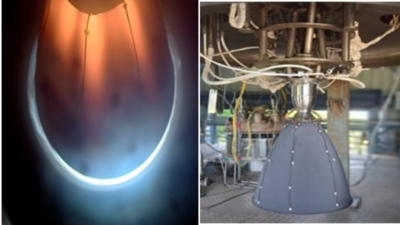- News
- India News
- Isro achieves breakthrough with lightweight carbon-carbon rocket engine nozzle
Trending
Isro achieves breakthrough with lightweight carbon-carbon rocket engine nozzle

BENGALURU: In what it describes as a significant advancement, the Indian Space Research Organisation (Isro) Tuesday said it has successfully developed a lightweight Carbon-Carbon (C-C) nozzle for rocket engines, marking a breakthrough in rocket engine technology.
This innovation, accomplished by the Vikram Sarabhai Space Centre (VSSC), promises to enhance the vital parameters of rocket engines, including thrust levels, specific impulse, and thrust-to-weight ratios, thereby boosting the payload capacity of launch vehicles.
VSSC has leveraged advanced materials like Carbon-Carbon (C-C) Composites to create a nozzle divergent that offers exceptional properties, Isro said.
"...Utilising processes such as carbonisation of green composites, chemical vapour infiltration, and high-temperature treatment, VSSC has produced a nozzle with low density, high specific strength, and excellent stiffness, capable of retaining mechanical properties even at elevated temperatures," Isro said.
The potential impact of this development is significant, particularly for Isro's workhorse launcher, the Polar
The PS4, the fourth stage of the PSLV, currently employs twin engines with nozzles made from Columbium alloy. However, by replacing these metallic divergent nozzles with C-C counterparts, a mass reduction of approximately 67% can be achieved.
This substitution is projected to increase the payload capability of the PSLV by 15kg, a notable enhancement for space missions.
The successful testing of the C-C nozzle divergent marked a major milestone for Isro.
"On March 19, a 60-second hot test was conducted at the High-Altitude Test (HAT) facility in ISRO Propulsion Complex (IPRC), Mahendragiri, confirming the system's performance and hardware integrity. Subsequent tests, including a 200-second hot test on April 2, 2024, further validated the nozzle's capabilities, with temperatures reaching 1216K, matching predictions," Isro added.
The collaborative effort involved the Liquid Propulsion Systems Centre (LPSC) at Valiamala, which designed and configured the test, and IPRC, Mahendragiri, which conducted the instrumentation and execution of the tests at their HAT facility.
This innovation, accomplished by the Vikram Sarabhai Space Centre (VSSC), promises to enhance the vital parameters of rocket engines, including thrust levels, specific impulse, and thrust-to-weight ratios, thereby boosting the payload capacity of launch vehicles.
VSSC has leveraged advanced materials like Carbon-Carbon (C-C) Composites to create a nozzle divergent that offers exceptional properties, Isro said.
"...Utilising processes such as carbonisation of green composites, chemical vapour infiltration, and high-temperature treatment, VSSC has produced a nozzle with low density, high specific strength, and excellent stiffness, capable of retaining mechanical properties even at elevated temperatures," Isro said.
A key feature of the C-C nozzle is its special anti-oxidation coating of silicon carbide, which extends its operational limits in oxidising environments. This innovation not only reduces thermally induced stresses but also enhances corrosion resistance, allowing for extended operational temperature limits in hostile environments.
The potential impact of this development is significant, particularly for Isro's workhorse launcher, the Polar
Satellite Launch Vehicle (PSLV).
The PS4, the fourth stage of the PSLV, currently employs twin engines with nozzles made from Columbium alloy. However, by replacing these metallic divergent nozzles with C-C counterparts, a mass reduction of approximately 67% can be achieved.
This substitution is projected to increase the payload capability of the PSLV by 15kg, a notable enhancement for space missions.
The successful testing of the C-C nozzle divergent marked a major milestone for Isro.
"On March 19, a 60-second hot test was conducted at the High-Altitude Test (HAT) facility in ISRO Propulsion Complex (IPRC), Mahendragiri, confirming the system's performance and hardware integrity. Subsequent tests, including a 200-second hot test on April 2, 2024, further validated the nozzle's capabilities, with temperatures reaching 1216K, matching predictions," Isro added.
The collaborative effort involved the Liquid Propulsion Systems Centre (LPSC) at Valiamala, which designed and configured the test, and IPRC, Mahendragiri, which conducted the instrumentation and execution of the tests at their HAT facility.
End of Article
FOLLOW US ON SOCIAL MEDIA











